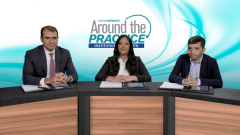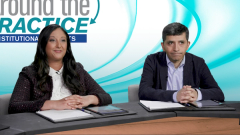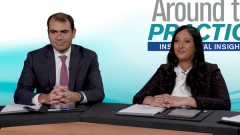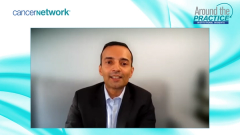
Selecting and Sequencing BCMA-Targeting Bispecific Antibodies in Relapsed/Refractory MM
Shared insight from expert hematologist-oncologists on the real-world application of teclistamab to improve the management of multiple myeloma.
Episodes in this series

Transcript:
Ajai Chari, MD, PhD:The minute you mentioned CAR-T I know your co-panelists starts salivating. Krina, what are your thoughts comparing these 3 different ways of targeting BCMA, ADC, bispecific, CAR-T?
Krina K. Patel, MD, MSc: It's a good problem to have than to just have one possible option. We have a lot to learn about which patients truly should go to which first. The other big issue is access. In the end, we must get our patients whatever we have access to. Right now with CAR-T, I do think a one-and-done for my patients is preferable in general to not be on any therapy at all. However, we don't have any comparative studies to talk about toxicity and long-term duration, but we do see great response rates for both of those. For me, I look at patients who are eligible for CAR-T similarly to patients who are eligible bispecifics. I know we talked about eligibility a little bit later too. I think the ADCs, again, they're still a great drug and it's a different mechanism of action. We all go after the same target, but these are different therapies in some sort. For me, the patients who can't go to bispecifics or CAR-Ts, the ADCs are a great option or if I can't, I don't have a spot or I don't have a way to get my patient that really needs something different. What I do worry about is sequencing. We're learning more, especially at ASH [American Society of Hematology meeting 2022]. There's a lot coming out now with a lot of the teclistamab studies, other CAR-T studies, real-world studies that are showing that maybe we'll have to figure out the sequencing. Again, when I can't just choose whatever, I want right now, these are all amazing, amazing therapies.
Ajai Chari, MD, PhD:Sequencing is a super-hot topic, but just want to explore briefly a very important topic that came up at the FDA meeting recently between the FDA and IMS, which is we're privileged in US [United States] and probably in Europe, to be having this accelerated approval pathway where if you have an unmet need, you can get access for your patients to a drug based on a single arm study without a control arm to put things into context. There have been 3 examples in myeloma where we've been burned by that with initially checkpoint, then also venetoclax and melflufen where they looked promising in single-arm studies but then the control arm showed us some signals that we didn't necessarily anticipate. Now, most recently with DREAMM-3, BELA versus POM-DEX, we found out that even though the PFS was slightly higher, the hazard ratio was right around one. One of the questions the FDA asked was, is there still a continued future for accelerator approval? Any concerns about bispecifics would be accelerated? I'll throw it out to any of you.
Sham Mailankody, MD: There is a future for accelerated approval. For the audience who's not familiar with accelerated approval, there's a requirement to do confirmatory studies. The 4 examples that you highlighted are to some degree, testament that those confirmatory studies were done. When they were not favorable, those drugs had in the case of melflufen rescinded in other cases that you mentioned. Venetoclax is now doing studies in specific subsets where the benefit may be more evident. I do think that there is a challenge with approving drugs too quickly. There's a balance between efficacy and safety, but we are talking about patients with 4, 5, 6 lines of treatment. As long as the field is committed to doing confirmatory studies and taking action appropriately when those studies are reported out, I think in balance, we should continue to be very cautious about these approvals, but in balance for drugs that have a response rate of 60% duration of response of 18 months in patients who otherwise do not have very many options in my mind is still a very reasonable thing to consider.
Alfred L. Garfall, MD, MS: I completely agree. When you have an accelerated approval, there is a potential for failure and rescission. That's not necessarily a failure of the system for an occasional accelerated approval to ultimately not be confirmed. You must put that on the scale with the tremendous benefit that can come from a truly effective drug. Making it out into widespread use early. In my opinion, from some of the patients being treated that we've treated with teclistamab on the clinical trial is that these were patients who would be dying of multiple myeloma if they didn't have access to the medication. We always must have the caveat when something receives accelerated approval, that is just accelerated approval. We don't know for sure that the drug prolongs progression-free survival or overall survival compared to anything else. If we are using the medication within the FDA label for this very needy population, we can feel comfortable using it and waiting for the confirmatory studies over time. The other point is to remember too, that the confirmatory studies sometimes ask different questions. The failure of one confirmatory study in one particular clinical setting doesn't mean that another one down the road might not be positive. It's all about finding the right role in patient population for these drugs where the benefits outweigh the risks.
Ajai Chari, MD, PhD:Krina, anything you wanted to add?
Krina K. Patel, MD, MSc: No, I completely agree, and I think with some of the accelerator approvals we've had recently with the 60 to 100% response rate, that is such a big difference that unless there's a huge safety issue, I can't imagine that this is going to affect these newer novel drugs right now. I agree with both my colleagues here, that our patient population, we're not curing patients right now. We hope to be one day, but we're not, and they need more therapies to survive this. If they're safe therapies and it works for some patients, we need a way to find that, to get it to them as soon as possible.
Ajai Chari, MD, PhD: To summarize, accelerated approval means you can't have a control arm because this is an unmet need which means none of the other current drug supply. Unfortunately, the delays in getting new therapies to these patients is literally a life and death delay. We agree for those of us that have been involved, as I know all four of us have with these agents, our patients are literally living so much longer because of these agents. Getting back to Sham, Krina set you up for this sequencing question. What do you want to say? Can you do more than one BCMA, one T-cell redirection?
Sham Mailankody, MD: The short answer is yes. The longer answer is we'll have to figure out how best to do it. Most of what we have done and those of us who are doing these studies have done so far, is based on convenience. What's available. It's very difficult when these treatments are available only in the context of clinical trials to be thoughtful about sequencing one drug after the other. It becomes what trial is available for a given patient and what do we do? Ajai, you're familiar with the study with Sinai where we looked at our patients who got CAR T-cell in the 2 institutions, MSK and Sinai and followed them out after they had progressed from a BCMA therapy. What stood out in that study was patients who got a second T-cell directive therapy, that's either a CAR T-cell or a bispecific antibody. Some of those patients got a second treatment targeting the same antigen BCMA were the ones who did the best. About small numbers, selection bias of 2 centers that are academic centers, et cetera. Of the 39 or so patients who got a second T-cell-directed therapy, the majority 90 plus percent had a response. Some of them ongoing responses for a good period. Certainly, is proof of concept. You can get more than one T-cell-directed therapy. There's also now early clinical trial results say from teclistamab, for instance, with prior patients who have received prior BCMA therapies, small numbers, but prospective clinical trial showing a response rate of 60 plus percent in that setting.
Transcript edited for clarity.
Newsletter
Stay up to date on recent advances in the multidisciplinary approach to cancer.









































